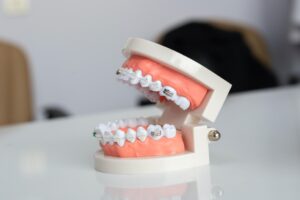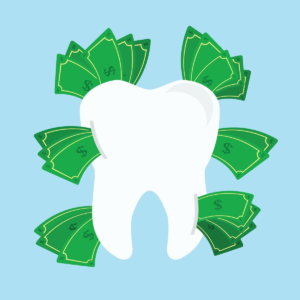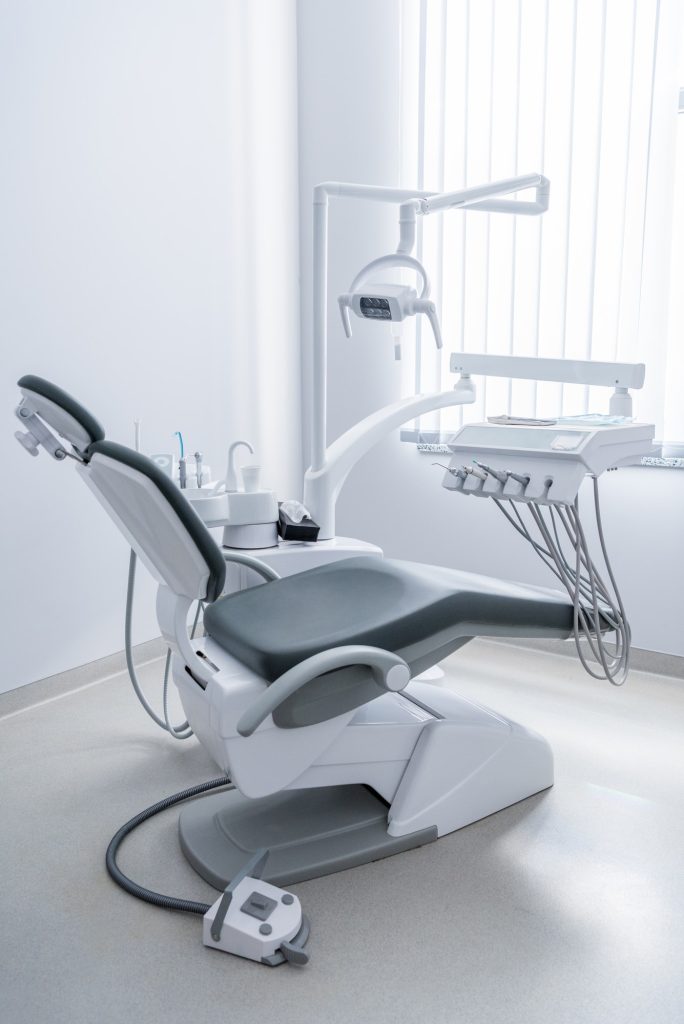[et_pb_section fb_built=”1″ admin_label=”section” _builder_version=”4.16″ global_colors_info=”{}”][et_pb_row admin_label=”row” _builder_version=”4.16″ background_size=”initial” background_position=”top_left” background_repeat=”repeat” global_colors_info=”{}”][et_pb_column type=”4_4″ _builder_version=”4.16″ custom_padding=”|||” global_colors_info=”{}” custom_padding__hover=”|||”][et_pb_text admin_label=”Text” _builder_version=”4.17.4″ background_size=”initial” background_position=”top_left” background_repeat=”repeat” global_colors_info=”{}”]
Dental crowns are one of the most common restorations people need on their teeth. This versatile tooth-coloured restoration resembles a natural tooth and blends seamlessly with your smile, allowing you to laugh, speak, and eat confidently.
If you have dental issues, you may be wondering when do you need a dental crown and if it is the right option for your smile.
What is a Dental Crown?
Your dentist will typically recommend a dental crown when more than 50% of the tooth’s structure is missing, and the tooth can no longer function. So, in most cases, dental crowns are a cap that restores a damaged tooth’s normal appearance, size, and function.
Dental crowns can protect the tooth or improve how it looks. Dental crowns can also be used as prosthetic teeth to top a dental implant or anchor a dental bridge.
When Do You Need a Dental Crown: Replace Large Fillings
If you have a tooth that has undergone multiple filling procedures or was severely decayed and required a large filling, you may need to replace your old filling with a dental crown. Large fillings can cause the tooth structure to weaken, leaving it vulnerable to breakage or chipping.
Your dentist removes the old filling material during a dental crown procedure and reshapes the tooth to accommodate the crown. Once the crown is cemented in place, it supports your remaining tooth structure, allowing you to bite, chew, and speak normally.
When Do You Need a Dental Crown: Complete a Root Canal Treatment
Root canal therapy treats an infected tooth and saves the tooth from extraction. The procedure involves making a small hole in your existing tooth crown and using endodontic files to remove the decayed tissue.
Once the tooth has been disinfected and sealed, you will receive a temporary filling. You will revisit your dentist once the infection has subsided to undergo a dental crown procedure.
Following a root canal treatment, your tooth is at an elevated risk of breakage, so the dental crown protects the tooth, restoring its functionality.
When Do You Need a Dental Crown: Protect a Weak Tooth
Deep decay due to poor oral hygiene or a diet high in sugar can weaken your teeth from the inside. Dental crowns protect weak teeth from fracturing or breakage.
After removing the decayed tissue, your dentist shapes the tooth and takes impressions to create the dental crown. The tooth-coloured cap covers the entire tooth surface, holding together the damaged tooth and preventing any bacteria from entering the pulp chamber and causing an infection.
When Do You Need a Dental Crown: Complete a Dental Implant
Dental implants have become the gold standard for replacing missing teeth. This permanent tooth replacement option can rejuvenate your smile and renew your confidence.
Once the dental implant site has healed, the site is reopened to add a connector, and about two weeks later, the implant is topped with a dental crown for a flawless smile. Click this link to learn more.
When Do You Need a Dental Crown: Restore a Broken or Cracked Tooth
Dental crowns are an excellent solution for rehabilitating a broken or cracked tooth. While cracks and breaks are more likely to appear in teeth with large fillings, they can result from a blow to the face. Internal fractures can also occur due to wear and tear from teeth grinding and clenching.
 When a tooth is fractured or broken, you are more susceptible to sensitivity from hot food, cold drinks, and chewing forces. If you are experiencing sensitivity and depending on the extent of the crack or break, you may need root canal therapy before getting a dental crown.
When a tooth is fractured or broken, you are more susceptible to sensitivity from hot food, cold drinks, and chewing forces. If you are experiencing sensitivity and depending on the extent of the crack or break, you may need root canal therapy before getting a dental crown.
If the crack or break is too large for a standard filling, then a dental crown can repair your tooth, so you no longer experience sensitivity and can enjoy your favourite foods and drinks again.
When Do You Need a Dental Crown: Hold a Dental Bridge in Place
If you have several consecutive missing teeth, your dentist may prescribe a dental bridge as a tooth replacement. A dental bridge consists of one or two dental crowns attached to between one and three false teeth (pontics).
The dental crowns provide the support structure for the pontics and are fitted over healthy adjacent teeth.
What to Expect During a Dental Crown Procedure
Before your dental crown procedure, your dentist applies a numbing gel to the gums surrounding the affected tooth and injects a local anaesthetic to ensure your comfort.
After opening the tooth crown and removing any decayed tissue, your dentist uses a high-speed grinding tool to shape the tooth so that the dental crown cap can fit flush with your adjacent teeth.
Once the tooth is prepared, your dentist uses a tray filled with polyvinyl siloxane or alginate to take dental impressions. These impressions are used to create a mould for the crown that is sent to an off-site lab where your permanent dental crown is fabricated.
The crown manufacturing process may take around two weeks, so your dentist may fit a temporary crown on the tooth to protect it while you wait. The temporary crown is removed at your second appointment, and the permanent one is cemented in place.
Contact Radiant Smiles Dental to Arrange Your Dental Exam
If you’ve been experiencing tooth sensitivity, have a chipped tooth, or are considering a tooth replacement option contact our practice on (03) 9000 0537 today for a dental exam. A dental crown can rebuild and preserve your natural tooth, restoring your smile and self-esteem.
Our dental team strives to provide all our patients with exceptional and gentle dental care in a comfortable, state-of-the-art facility.
Consult your Bundoora Dentist today.
Note: Any surgical or invasive procedure carries risks. Before proceeding, you should seek a second opinion from an appropriately qualified health practitioner.
References
Restoration of Endodontically Treated Teeth: Materials Review
https://www.researchgate.net/publication/320172869_Restoration_of_Endodontically_Treated_Teeth_Materials_Review
Dental crown procedure
https://www.healthdirect.gov.au/dental-crown-procedure
Dental Crowns
https://my.clevelandclinic.org/health/treatments/10923-dental-crowns
[/et_pb_text][/et_pb_column][/et_pb_row][/et_pb_section]
 Now
Now
















